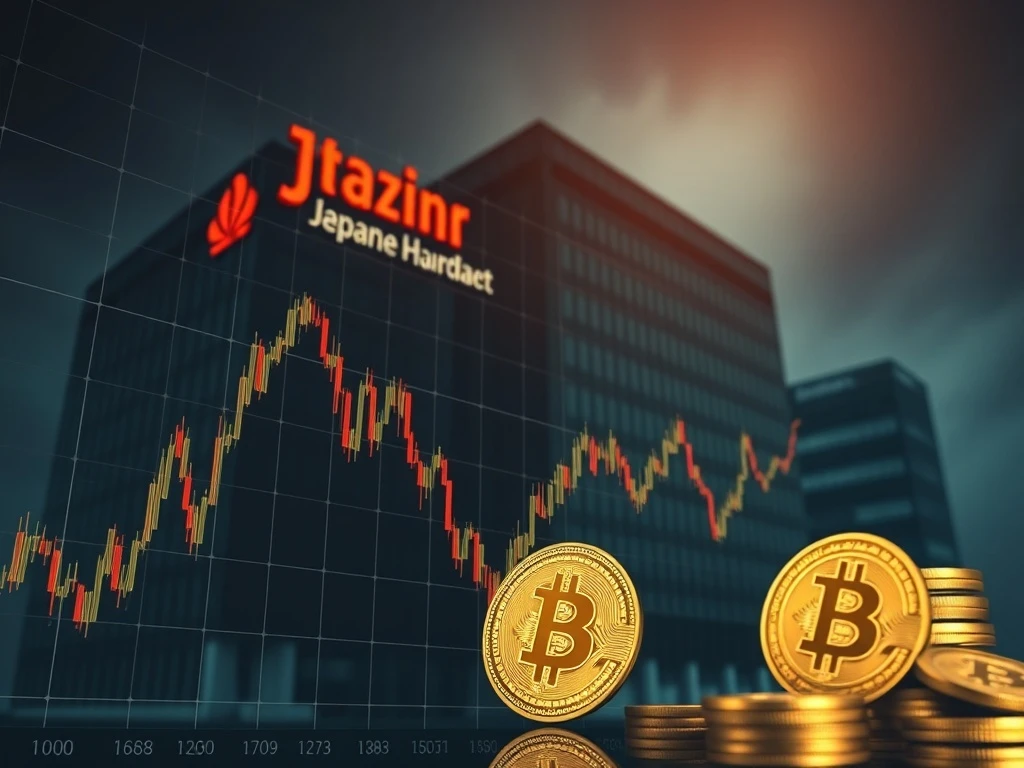Metaplanet’s ambitious Bitcoin accumulation strategy now teeters on the brink of collapse as the company’s share price plummeted 54% since mid-2025, exposing critical vulnerabilities in corporate cryptocurrency treasury models that depend heavily on equity market performance.
Metaplanet’s Bitcoin Accumulation Strategy Faces Existential Threat
The company’s aggressive Bitcoin accumulation strategy has hit a devastating roadblock. Consequently, Metaplanet’s flywheel model—which relied on rising stock valuations to fund additional Bitcoin purchases—has completely stalled. This development highlights the inherent fragility of equity-dependent cryptocurrency strategies. Moreover, the company’s warrants became worthless as shares crashed from $100 to $45, eliminating a crucial funding mechanism.
Funding Crisis Forces Strategic Pivot
Metaplanet now scrambles for alternative financing solutions. The firm announced a $3.8 billion preferred share offering with 6% annual dividends. However, this approach introduces significant new risks. Preferred shares remain uncommon in Japan’s investment landscape. Therefore, traditional investors may hesitate to participate due to structural unfamiliarity. Additionally, the company capped Bitcoin collateral at just 25% of holdings, limiting flexibility.
Broader Industry Challenges for Bitcoin Accumulation Strategies
Metaplanet’s struggles reflect sector-wide problems. Over 125 public companies collectively hold 847,000 BTC as of Q2 2025. However, sustainability concerns grow increasingly urgent. For example, MicroStrategy’s massive Bitcoin portfolio shows similar stress signals. Its market-to-NAV premium dropped from 4.0x to 1.4x recently. Similarly, Tesla’s experience with Bitcoin demonstrates volatility risks. The core issue involves Bitcoin’s extreme price fluctuations, which average 78.93% daily swings.
Accounting and Regulatory Complications
Accounting standards exacerbate these challenges. Under U.S. GAAP rules, companies must report Bitcoin at fair value. This requirement dramatically amplifies earnings volatility. Unfortunately, inconsistent global accounting practices create investor confusion. Furthermore, regulatory uncertainty persists across jurisdictions. Japan’s evolving crypto framework adds another layer of complexity. Morningstar DBRS specifically warns about increased credit risks from corporate Bitcoin exposure.
Competitive Pressure from Bitcoin ETFs
Institutional Bitcoin ETFs present formidable competition. These products captured $21.2 billion in Q1 2025 alone. They offer regulated, liquid alternatives to corporate treasury models. Consequently, companies like Metaplanet struggle to justify their risk premiums. If Bitcoin’s price corrects significantly, this challenge will intensify. The ETF advantage becomes particularly evident during market stress periods.
Strategic Outlook and Critical Challenges
CEO Simon Gerovich maintains bullish projections targeting 100,000 BTC by 2026. However, the company must overcome three critical hurdles immediately. First, restoring share price momentum through successful preferred share sales. Second, implementing volatility management through derivative strategies. Third, navigating regulatory evolution in Japan and globally. Success requires attracting institutional investors despite structural unfamiliarity with preferred shares.
Conclusion: High-Risk Proposition in Volatile Markets
Metaplanet’s Bitcoin accumulation strategy exemplifies the dangerous intersection of cryptocurrency volatility and corporate finance. While Bitcoin’s potential as an inflation hedge remains compelling, the dependence on equity markets creates systemic vulnerability. The company’s future viability depends on Bitcoin maintaining its store-of-value proposition amid extreme market conditions. Ultimately, the line between financial innovation and instability has never been thinner.
Frequently Asked Questions
What is Metaplanet’s Bitcoin accumulation strategy?
Metaplanet’s strategy involves using equity financing to accumulate Bitcoin reserves, aiming to hold 1% of total Bitcoin supply by 2027 through stock issuance and warrant exercises.
Why did Metaplanet’s strategy fail?
The strategy collapsed because falling share prices made warrant exercises unattractive, cutting off the primary funding mechanism for additional Bitcoin purchases.
How does Bitcoin volatility affect corporate treasuries?
Bitcoin’s average 78.93% daily price swings create earnings instability and potential margin calls, particularly for leveraged companies using cryptocurrency as treasury assets.
What are the alternatives to corporate Bitcoin accumulation?
Institutional Bitcoin ETFs provide regulated, liquid exposure without the leverage risks associated with corporate treasury strategies, capturing $21.2 billion in Q1 2025.
How do accounting standards affect Bitcoin reporting?
U.S. GAAP requires fair value reporting of Bitcoin holdings, creating significant earnings volatility compared to IFRS rules and complicating investor comparisons across companies.
What risks do preferred shares introduce for Metaplanet?
Preferred shares are uncommon in Japan and may deter traditional investors unfamiliar with their structure, while dividend obligations create additional financial pressure.


